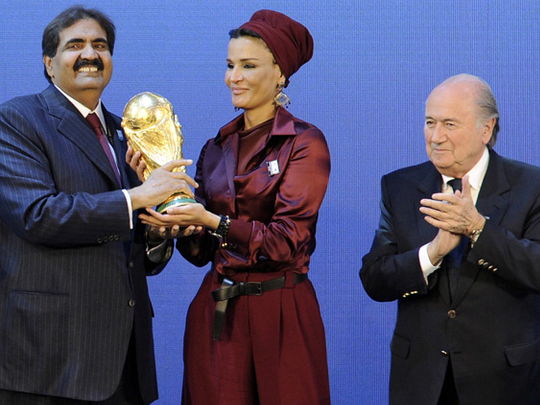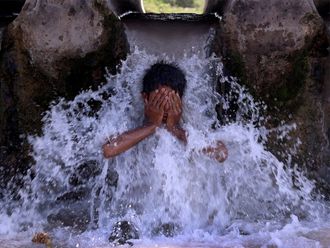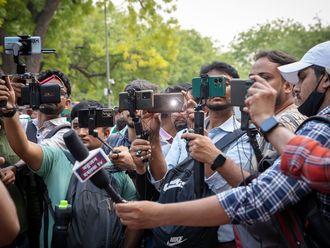
When Fifa announced earlier this month to a stunned world that tiny Qatar will host the 2022 football World Cup, it signalled the arrival of the Gulf era.
Clearly the events in our region have climaxed and caused this titanic shift, changing stereotypes about the insignificance of our region. Fifa's decision was a nod of approval, and a confirmation and admission that our moment has come and size in a globalised world no longer matters.
What made Qatar's triumph and, by association that of the Gulf Cooperation Council (GCC), doubly rewarding was that on its way to clinch the World Cup it beat powerhouses like the US, Japan and South Korea, which have hosted football World Cups before. Qatar even achieved what larger Arab countries, like Egypt and Morocco, failed to in past years. In a way, Qatar embodies the story of how far we have come despite all the turbulence and instability in our region.
The clear message today is that we have been finally recognised by the world. This is our moment in history.
For decades, the GCC — both as individual countries and later as a regional organisation on the "periphery" of the Arab world — was ignored, dismissed and understudied by western academics and Arab intellectuals alike. It is hard to find a non-Gulf Arab specialist on the GCC. The Gulf region was upstaged by the adoption of a more ethnocentric approach, which focused almost exclusively on the heart of the Arab world — Egypt, the Levant and Iraq.
The oil-producing states led the oil boycott against the West, mainly the US, in 1973 as a show of solidarity with Egypt and Syria in the 1973 Arab-Israeli war. Before that, Kuwait, Saudi Arabia and the UAE set up economic funds to help other Arab states build their infrastructure. That strengthened the Arab cause.
With the marked increase in oil prices and windfall profits, the GCC states embarked on ambitious and unprecedented development plans which paved the way for millions of Arab and non-Arab expatriates to flock to GCC capitals and help their families back home by transferring over $60 billion (Dh220.68 billion) in annual remittances.
The GCC states — with their small population, oil and gas resources, their role as responsible providers of energy to the world, their moderate regimes and sovereign wealth funds — have changed the rules of the game. With the decline of the traditional players like Egypt, Iraq and Syria, who for decades formed the heart of the Arab world, the GCC led the Arabs, with Saudi Arabia and the smaller Gulf states gaining more confidence and becoming the heart of the Arab world.
Clearly, the centre of gravity has shifted towards the Gulf region. The GCC states, with less than 8 per cent of the Arab world's population, account for over 55 per cent of its gross domestic product (GDP). The value of their sovereign wealth funds exceeds $2 trillion and the value of their oil reserves at $100 a barrel exceeds $18 trillion. The obvious soft power of these countries compensates for the lack of hard, military power. But this continues to worry the GCC states collectively and individually. Saudi Arabia is the only Arab country in the G20 and has the highest GDP in the Arab world. Abu Dhabi has the world's largest sovereign wealth fund and Kuwait pioneered the Arab economic fund. Today, it is Qatar that is setting the future trend.
Joseph Nye coined the term "soft power" to "describe a nation's ability to attract and persuade ... Soft Power rises from the attractiveness of a nation's culture, political ideals, and policies." There's no doubt that at the individual and collective level, the GCC states possess a lot of soft power.
As a result of ambitious development plans, they have transformed their cities into modern metropolises which rival those in the West. Their standard of living and GDP per capita are among the highest in the world. For instance, Qatar tops the world in economic growth and also has one of the highest incomes per capita.
Showcase for change
Lately, the GCC states have been the showcase for major changes. They have been leading the region in economic growth, in mediating disputes among Arab and non-Arab countries, and are becoming hubs for branches of top universities, think-tanks and world renowned hospitals. They also hold major conferences, and sports events. Despite the harsh weather conditions, the ingenuity and determination of these countries has made them tourist havens. They have pulled the rug from under the feet of the traditional Arab powerhouses and beaten them at their own game.
But to make this trend a lasting one, the GCC states have to tackle head on their security challenges. The most troubling problem continues to be the GCC's failure after three decades of its inception to become a formidable security and deterrence organisation that can safeguard its members.
GCC states can be proud of their accomplishments. Our Arab brothers have to view our achievements as an added value for us all and not see us as rivals. The rest of the world has to adjust and deal with us accordingly. This is the trend of history. The moment is ours but we should not get carried away or squander it.
- Professor Abdullah Al Shayji is the Chairman of the Political Science Department — Kuwait University.












